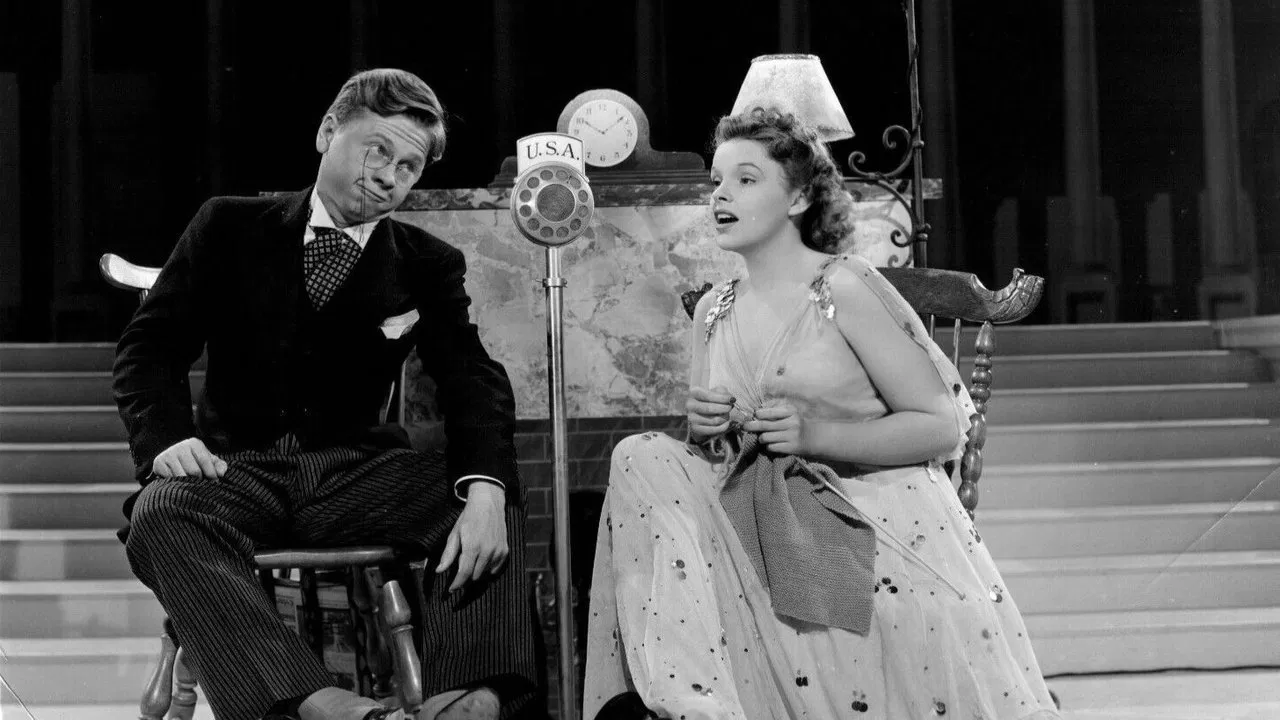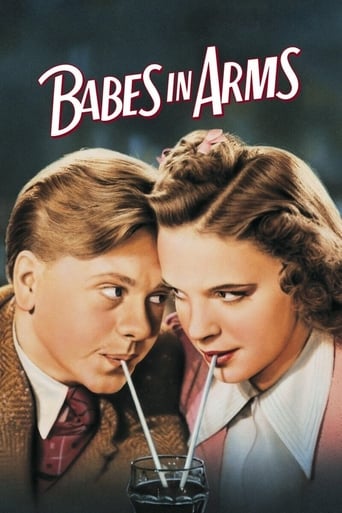

Waste of time
... View MoreA film with more than the usual spoiler issues. Talking about it in any detail feels akin to handing you a gift-wrapped present and saying, "I hope you like it -- It's a thriller about a diabolical secret experiment."
... View MoreThe film creates a perfect balance between action and depth of basic needs, in the midst of an infertile atmosphere.
... View MoreThe movie turns out to be a little better than the average. Starting from a romantic formula often seen in the cinema, it ends in the most predictable (and somewhat bland) way.
... View MoreMickey Rooney plays the son of vaudevillian parents, most of whom have decamped to Long Island. Vaudeville is dead now that it's 1939, but Mickey has performing in his blood, even selling the song "Good Morning" which is original to this movie. (Arthur Freed, who wrote the lyrics, would later reuse it in Singin' in the Rain.) When Mickey finds out that Margaret Hamilton is going to evict the underemployed vaudevillians and send their kids off to work schools, he vows to put on a show to bring in the money. He does with with the help of Judy Garland and June Preisser among others (watch for a young Johnny Sheffield).Some of the musical numbers are interesting, such as one with all the young folks marching through town and starting a bonfire. And then there's the blackface number that's the bulk of the show Mickey writes. It's almost as nuts as the one Joan Crawford does in Torch Song, except that the later movie is in Technicolor and gets to show off Crawford's hair. There's also the finale, that has Mickey and Judy doing their impressions of Franklin and Eleanor Roosevelt respectively.Mickey also gets to do an impression of Lionel Barrymore (not too successfully), and Clark Gable (absolutely hilarious). Mickey is determined and almost manic, to the point I half expected him to exclaim, "As God is my witness, I'll never go hungry again!" This movie would normally be a 7/10, but Mickey Rooney's 9/10 performance raises it to an 8/10 for me.
... View MoreDespite the superior acting, singing, dancing; despite the quality of the music--which is excellent--like the other Freed/Berkeley productions featuring Judy Garland and Mickey Rooney--this movie cannot transcend its severe limitations. And the performance they deliver is excellent. Mickey Rooney channels FDR most excellently; Judy Garland mimics Eleanor most excellently. In Blackface, they seem to gather an energy and momentum that cannot be stopped or topped. And yet like the other 3--the movie simply grows tiresome--one viewing every ten years seems about right.And there really does need to be a note about Blackface. This was not intended to insult Black people--the Jim Crow laws did that. Mickey, Judy, Berkeley, Freed, etc. all would have grown up with seeing the Minstrel Show as entertainment; not for a moment would they have considered this demeaning to Black people. Those songs they sing in imitation of old vaudeville days--were very real in their mind; just consider your own life and realize how songs popular in our youth still stay within our mind as fresh well into our old age. So too with the Minstrel Shows--they would stay with the performers long after they had seen them.
... View MoreJudy made an amazing transformation in the latter part of '39 from Dorothy in "The Wizard of Oz" into Mickey Rooney's girlfriend, in what amounts to a transformation of the Andy Hardy series into a musical drama: the first of a series of 4, 3 directed by Busby Berkeley, who also directed the spectacular finale of the 4th. The general construct of the subsequent films was established in this film, with a big production number toward the end of the first half, and another, representing the finale, with lesser musical numbers in between. Actually, in this film, in contrast to the subsequent films, we have two big production numbers toward the end. The first of these is the minstrel show, which serves as a model for the amazingly similar, in many ways, longer minstrel show in "Babes on Broadway". In both these shows, Mickey plays the stock minstrel character Mr. Bones, while Judy plays the stock character Mr. Tambo, who engage in a bit of inane dialogue with the MC. In both films, there is a brief soft shoe dance to a classic moon-based song: Mickey dancing to "Moonlight Bay" here, while Ray McDonald later danced to "By the Light of the Silvery Moon". These served as breathers in these mostly manic productions. In both films, Judy later ditches her blackface Mr. Tambo character to become a mulatto singer/dancer. Here, she sings "I'm Just Wild About Harry", with Mickey later joining in, then the chorus taking over as they dance wildly. This production lacks the latter part of the long minstrel show in "Babes on Broadway". It's like BB wanted to redo it with more of his typical features, such as some overhead projection shots and more chorus line shenanigans. If you are sensitive to blackface productions, especially involving stock minstrel characters, please skip these parts of these films. I don't have a problem.The rousing anti-fascist patriotic finale features the USA-praising song "In God's Country", which includes a variety of scenes and themes, some inane, sometimes with a big picture of the capitol in the background. In part, Mickey plays FDR. Actually, Judy is much better in imitating wife Eleanor during the fireside chat segment. Mickey's previous attempts to mimic other actors also fell rather flat, except perhaps for Eddie Cantor's "Ida". The first big production, unlike the more traditional comparable productions in the subsequent films, is the bizarre scene where the gang of thespian hopefuls march through the streets while singing, carrying torches and gathering crates for a bonfire which they dance around, while McPhail sings defiant verse from a podium. Yes, it does have the look of a Nazi rally, as some others have noted. But, it's really a symbolic burning of old vaudeville traditions. This scene was instigated by their disappointment in Mickey's father rejecting Mickey's new style of musical compositions and screenplays he proposed that his father help sponsor.This film can also be thought of as a model for some of Universal's wartime musical comedies starring young Don O'Connor and Peggy Ryan, who were Uiversal's version of Mickey and Judy. Most of their film series included an opera-styled teenage female singer, and occasionally a Nelson Eddy-type singer, who provided a sophisticated dimension to some of the music. We see the same thing here, which is lacking in the subsequent Mickey + Judy musicals. Douglas MnPhail's booming operatic voice dominates a number of scenes: most memorably the mob march and bonfire scene. He was a significant character in the screenplay, as well. Betty Jaynes, who plays Mickey's sister, was his female counterpart, and his off-screen wife at this time. They had one too brief and interrupted duet to the classic "When or Where", from the play "Babes in Arms". Betty also did a bizarre, very abbreviated, comedic, "You Are My Lucky Star". This prior Brown and Freed song, along with their new theme song "Good Morning" would again be featured in "Singing in the Rain". Very tragically, this singing duo would be doomed to brief film careers, as '30s-styled operettas were about to go out of style. Nonetheless, they certainly could have been used in other types of musicals or in straight dramatic roles. McPhail looked much like Clark Gable at his age, and, from what I saw, could have succeeded in purely dramatic roles. Alas, he soon became an alcoholic, and succeeded in a second suicide attempt a few years later. Veteran vaudeville-film actor Charles Winninger was the main character in the first portion of the film., savoring his life in the heyday of vaudeville and fathering a son who would become Mickey's character. With the advent of soundies, vaudeville went into a step decline, thus he advises Mickey and friends not to try to follow as a stage actor.June Preisser plays 'Baby' : the sexy blond daughter of a rich family whom Mickey has to play up to in order to hopefully obtain the financing for his show. His date with her in her mansion is rather comical. Naturally, Judy becomes jealous and wants to run away. But Baby's father pulls her from the lead female role in the show, giving Judy a chance to take her place....June would return to play a similar role in the next film in this series "Strike Up the Band". She was noted for the gymnastic and contortionist aspects of her 'dancing'.
... View MoreWith the popularity of "talkies" (talking motion pictures), vaudeville stage performers find themselves increasingly out of work in the early 1930s. Practically born at the Palace Theatre, energetic teenager Mickey Rooney (as Michael "Mickey" Moran) tries to help out his parents and their generation of fading live performers by writing a stage show. His lead singer and potential love interest is spunky Judy Garland (as Patsy "Pat" Barton). However, there is a rival for Mr. Rooney's affections. Their Seaport, Long Island show could be destined for Broadway, but it's not all smooth sailing...MGM "teen idols" Rooney and Garland were more wholesome than those kids at other studios - especially the "Dead End" kids at Warner Bros. "Babes in Arms" entertained teens, parents - and even grandparents - with a cross-generational, albeit flimsy, story. It's a tuneful trip, despite being trimmed of some original stage songs; the medleys and production numbers make it seem bigger and more musical. This is Rooney's film, with director Busby Berkeley and co-star Garland more or less inviting you to join in and share his screen. Everyone does a good job for the star...You get the impression there isn't anything Rooney won't try. He postures throughout. The box office champ impersonates Clark Gable and Lionel Barrymore well but doesn't do Franklin D. Roosevelt justice. Be prepared to cringe at the "minstrel show" wherein Rooney and Garland lead the troupe in a "blackface" barnstormer. This entertainment staple comes across dreadfully; others, most specifically Al Jolson, could get under the colored skin and perform with pathos, dignity and a bit of respect. Here, you have stereotypical exaggeration, with no imagination.***** Babes in Arms (9/15/39) Busby Berkeley ~ Mickey Rooney, Judy Garland, Douglas McPhail, June Preisser
... View More